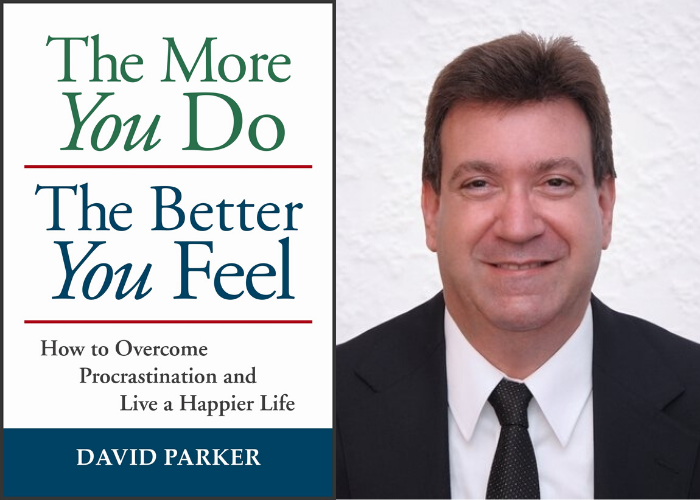If you’ve ever found yourself putting off tasks, preferring to stick your head in the sand rather than confront a looming deadline, then you just might need to read David Parker’s book: The More You Do The Better You Feel: How to Overcome Procrastination and Live a Happier Life.
David Parker, a fellow New Yorker, spoke with me ahead of his talk and book signing this Saturday at Q.E.D. in Astoria about the vicious cycle of procrastination and how he personally overcame his own disabling procrastination.
Your upcoming talk is about how we can stop procrastinating on our New Year’s resolutions. What’s the biggest reason people procrastinate?
People procrastinate for a variety of reasons. Some people just need a break, and there’s nothing wrong with taking a break; in fact, that’s healthy behavior. Procrastination becomes a problem when it develops into an ingrained habit. That is, when someone starts to automatically feel resistance towards working on a task and their fear or lack of self-esteem stops them from taking action.
Your book The More You Do The Better You Feel: How to Overcome Procrastination and Live a Happier Life talks about how you overcame your personal struggles with being a chronic procrastinator and developed a plan of attack to stop procrastinating. What are some of the biggest lessons you learned in the process of writing the book?
I learned that when I’ve just got to get something done, if I’m determined enough nothing will stop me! A lot of writers, like me, have found that writing is far easier than editing, and publishing a book is much easier than promoting it.
In the book, I talk about how I developed an anti-procrastination technique which I call “The J.O.T. Method.” The acronym “J.O.T.” stands for “Just One Task.”
Basically, if you’re a habitual procrastinator, you’ve probably put off so many tasks that even just the thought of dealing with one of them sends alarms up and down your nervous system. In my book, I teach you how to focus on just one task in a well thought-out way that takes into account your incredibly sensitive nervous system. I practice “The J.O.T. Method” to this day (even today, Monday, January 13th.)
You also talk about how habitual procrastination can lead to low self-esteem and even depression in some individuals. Can you tell me more about the connection between procrastination and depression?
I wrote The More You Do The Better You Feel from a highly personal perspective. The first half of my book focuses on my long history of procrastination and in it, I’ve included some of the weird events that took place that resulted from too much delay.
In one chapter there’s a section called, “Science Experiments in the Kitchen,” which is about the time that I let every single pot, pan, plate, cup, and utensil accumulate in my kitchen sink to the point where I came home from work one night, and then saw (and smelled) the mess, and then I promptly put my coat back on and went out in that cold November evening to a convenience store where I bought plastic utensils, and paper cups and plates. Is it any wonder that I suffered from depression?
I decided to write my book after I went through an intense period of self-analysis. I came to realize that procrastination was ruling my life and I needed to break free of it.
It’s well known that depression drains a sufferer of energy and then procrastination leads to low self-esteem, which only worsens one’s depression. So it becomes a never-ending downward cycle.
What advice do you have for someone whose friend or significant other’s chronic procrastination is hurting the relationship?
I’m glad you asked that because Chapter Fourteen in my book is titled: “The Procrastinator’s Relationships with Significant Others.” In that chapter, I talk about two common situations. The first is the husband / wife / boyfriend / girlfriend in a relationship who is the “do-er.” The “do-er” often complains, “How come I’m always doing the (fill in the blank).” That blank part could be “the laundry,” or “shopping for groceries,” or “mopping the floors and cleaning our home.”
The other example of the procrastinator’s relationship with significant others is how they interact with co-workers and supervisors in the workplace. Procrastinators are easy to spot at work because they are typically latecomers and they are also clock watchers.
The advice that I give to habitual procrastinators who are in difficult circumstances with partners or co-workers is to try to understand things from the other person’s perspective. Of course, that’s a very simple explanation, however, it’s elaborated in detail in my book.
You compare the habitual procrastinator to an ostrich sticking its head in the sand. Can you tell me more about that analogy?
I call habitual procrastinators “Human Ostriches” because it’s an easy visual concept for the mind’s eye. Of course, we all know the tale of the ostrich which, according to lore, hides his head in the sand as a reaction to fear. The actual truth is that ostriches forage for pebbles which they swallow to aid in the digestion of food. Many habitual procrastinators automatically react to the thought of dealing with their tasks with such an aversion that I think the analogy to the ostrich works well.
Learn more tips about how to stop procrastinating this Saturday, January 18th, at 2pm at Q.E.D. in Astoria (details here) where David Parker will be giving a talk and signing copies of his book The More You Do The Better You Feel at a special reduced price.


